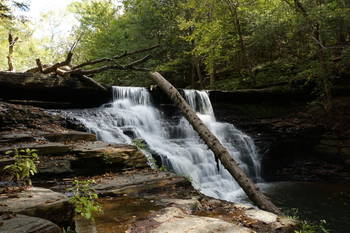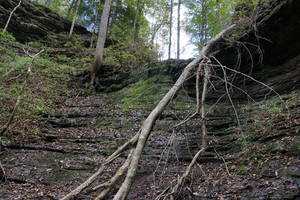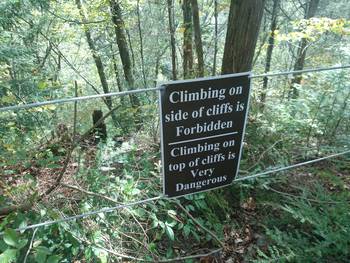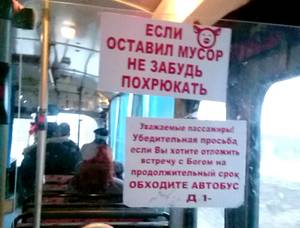Exploration

I went to University in a small town whose population reduced by a third when school was out of session. Past the edge of town was a state park filled with amazing waterfalls, but if you turned off a few roads early, you’d come to a dead end. Beside the road was a trail that led back between houses and down to a secluded creek, a series of cliffs and a maze of paths used by dirt bikes and all-terrain vehicles. We spent weekends exploring this crazy area which so few people knew about.
Today it’s now officially part of the larger state park network. The old entrance has been closed off and an official parking lot has been built three kilometers away. Many of the most amazing trails have been closed off to the world, either sighting safety concerns or with no trespassing signs indicating the borders of private property. What was once a place of imagination and exploration became tamed. Other hikers I met from that era are glad the area is preserved, but I could hear the sense of loss and nostalgia in their voices; that feeling of saudade from that time when we felt like we were on the frontier, trekking through an undiscovered country in our own backyards. On those weekends, between the deadlines of projects, assignments, fraternity parties and final exams, we spent time exploring, both our world and ourselves.
Over a decade ago, I took two friends of mine on a hiking trip to one of these waterfalls, long before it was a park. Sitting by a creek, the Canadian offered us oranges. The water rushed over my feet as I watched orange peel float past them downward towards the waterfall. Then I saw entire slices of orange float past. Turning I saw the man with the fruit pushing slices of orange into a stone. The rock had asked him for a piece of orange. The drugs hadn’t even kicked in yet— this was just the way he was.

The three of us walked into one of the alcoves, following a tiny stream. It was filled with tiny crawdads, tadpoles, frogs and small fish. We reached an embankment where water dripped down from several meters above. The third member of our party asked what was on the other side. When I said I didn’t know; that I had never been past this point, she proceeded to climb up the embankment. Covered in dirt and mud, we dredged through the woods until we found a trail, which ended up being part of a driveway. A woman drove down to inform us we were on private property. We explained we were lost and just trying to find our way back to the road. The woman repeated herself, angers crossed, and we eventually continued on until we found a street and started trekking our way back to my vehicle.
We were confronted with the very real question of, “What does it mean to have private property?” People purchase vast swatches of land, full of trees and wildlife and beauty, which they may rarely visit and never truly explore. What does it mean to own such land, which was once a wilderness trampled upon by swaths of life so vast and so old, that they’d dwarf all of humanities constructed ideas of what it means to own anything at all. We were explorers, simply trying to find what was on the other side of a waterfall.
Today, the same area is covered with No Trespassing signs. Ignoring them, I traveled up to the old cove, walking by the old split in the creek, and discovering the water dripping down from above. It was exactly how we had left it, some fourteen years ago. Not being part of the official park, the same downed tree that reached through the droplets of water falling to the creek below, was in the exact same position. Unmoving and unwavering, it was a moment frozen in time.

Once, we were explorers. I remember looking at maps on my desktop computer, writing down or memorizing street names, and discovering old Geocities web pages with photos of tails and graveyards. People would e-mail me about photos on my own site, now long gone, thanking me for helping them remember those places we explored. If we got lost, we’d have to backtrack, both on the trails, on the streets and in our lives. Our friends were our navigation units. Each weekend we returned from those cliffs, we’d add more to the poorly sketched out map on the living room whiteboard. We had the other trail we discovered, the second set of cliffs, the field with the cow bones, and the creek that wrapped around it all.
The cliffs had windows, eroded holes in the limestone ridge. Thousands of cracks still span the stone, dividing it into thousands of individual rocks. They will eventually fall, and the efforts by the people of the forestry services are to preserve the formations for as long as possible. In many parks around the world, trails are cleared in such a way as to switch back upon rising elevation, preventing runoff from turning parks into mudslides. Much of the tireless work done by state employees and volunteers are to preserve nature, to ensure that beauty can withstand the onslaught of our continually sprawling populations.
"They took all the trees, and put em in a tree museum
And they charged the people a dollar and a half to see them
Don't it always seem to go
That you don't know what you got 'til it's gone
They paved paradise, and put up a parking lot
"-Big Yellow Taxi, Joni Mitchell (Song)
When I returned to my university town a few weeks ago, I would constantly pull over to check the map on my phone, rather than drive around aimlessly trying to remember where I was. Unlike the city where I grew up, that I knew better than the back of my hand, four years was apparently not enough time to learn all the intricacies in a way that would stay etched in my memory over a decade later. I don’t see this as moving backwards in any way. As in other cities I’ve lived in where I switched from walking/hiking to cycle to eventually buying a vehicle; I simply used better tools to push the limits of where I could explore.

In a hostel in Malaysia, one of the girls told the other guests about how she paid a taxi driver to take her several hours outside of the city to find a elephant sanctuary. She met those who took care of these majestic animals and swam with elephant calfs in murky waters south of Kuala Lumpur. An older fellow I met in at a hostel in the outback of Australia mentioned a trip into the jungles of South East Asia. He and his guide stumbled upon a culture celebrating a harvest festival, the mens’ only coverings being small carved horns around their penises. During my time visiting Peace Corps volunteers, a close friend of mine wore one of her few skirts, as a sign of respect as we traveled in a rutieră, a white microbus used for public transport. We made our way to Orhei Vechi, a site of an ancient monastery in nation of Moldova, one of the least traveled countries in all of Eastern Europe.
Exploration has changed, but it never ends. Parts of the frontier we grew up with have been tamed, sometimes turning into parks, and other times parking lots. But there is still a frontier. If anything, technology has made it more difficult to travel out to the edge. Parts of what are considered the developing world are now often blanketed with 4G and Wi-Fi signals. Within our lifetimes, space tourism may become affordable for the masses.
There was value in the ability to get lost, and sometimes even find our way back. When a map wasn’t a phone lookup away, we had to pay attention. We looked at street signs. We had to plan to meet somewhere, at a certain time, and when someone didn’t show we’d have to walk to a payphone. “Nick’s mom said he left thirty minutes ago,” would mean we’d wait in that parking lot, wondering where on earth our friend could be. Technology has closed those gaps, and rather than feeling we’ve lost anything, we should realize it makes it easier to push further than we ever did before.
Exploration does not happen outside in the world until it happens first within our minds. Those days back in University, we explored space and time, friendships and love and all those other things the world tries to shove into our heads. We found not only hidden forests with deep green trees and crystal clear watering holes, we explored the deep reaches of who we are. We talked about what made us angry and what made us cry. We explored our minds on the beaches of time, and on literal beaches where we spent entire days etching the words “Mother, Should I Trust the Government?” in the sand with letters large enough to be seen by passing Air Force pilots. We were not afraid to ask the real questions, ones we have since grown to be afraid of in this mess we call adulthood.
The great absurdist tragedy is that life will never give us the answers we seek. No matter how far we stretch our arms throughout the universe with more powerful ships and deep space exploration vessels, no matter how far we submerge ourselves in our oceans, no matter how deep we crawl into the fragile fabric of our own minds, the universe doesn’t offer us an explanation for our existence. Yet that doesn’t stop us. We aren’t deterred by the confirmation of our own finality. We aren’t moved from our inherent desire to be more than ourselves, whether that involves treks through the frontier or simply raising those young versions of ourselves we love to have a better world than us. Humanity needs to continue growing, because if we don’t grow, we die. We don’t climb mountains because the universe gives us a reason to. We climb mountains because they are there.
“…take all that money that we spend on weapons and defense each year and, instead, spend it feeding, clothing and educating the poor of the world, which it would many times over, not one human being excluded, and we could explore space, together, both inner and outer, forever, in peace.” -Bill Hicks
